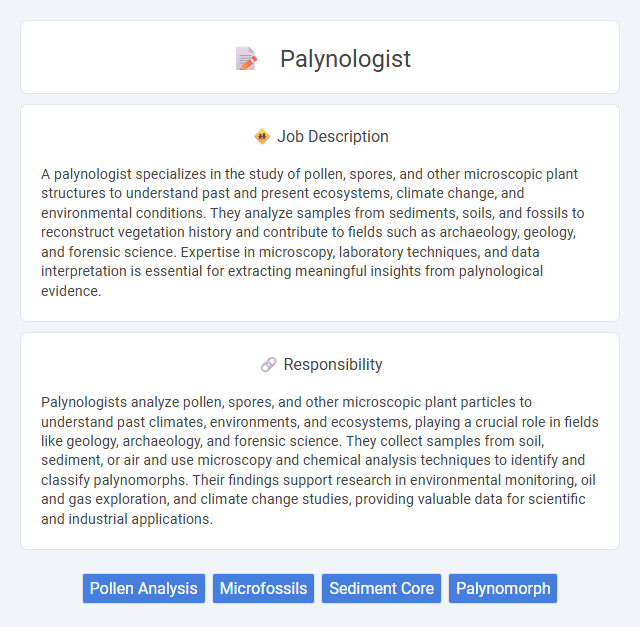
A palynologist specializes in the study of pollen, spores, and other microscopic plant structures to understand past and present ecosystems, climate change, and environmental conditions. They analyze samples from sediments, soils, and fossils to reconstruct vegetation history and contribute to fields such as archaeology, geology, and forensic science. Expertise in microscopy, laboratory techniques, and data interpretation is essential for extracting meaningful insights from palynological evidence.
Individuals with a strong interest in biology, geology, and environmental science are likely to find a career as a palynologist suitable. Those who are detail-oriented, enjoy working both in laboratories and outdoor settings, and can handle meticulous data analysis may have a higher probability of thriving in this role. People who prefer routine tasks or dislike microscopic examination might find this profession less compatible with their skills and preferences.
Qualification
A palynologist typically requires a bachelor's degree in geology, biology, or environmental science, with many positions favoring a master's or doctoral degree specializing in palynology or micropaleontology. Advanced knowledge of sediment analysis, fossilized pollen identification, and microscopic techniques is essential for accurate environmental and geological assessments. Proficiency in data interpretation and experience with laboratory technology enhance a palynologist's ability to support research in climate change, archaeology, and oil exploration.
Responsibility
Palynologists analyze pollen, spores, and other microscopic plant particles to understand past climates, environments, and ecosystems, playing a crucial role in fields like geology, archaeology, and forensic science. They collect samples from soil, sediment, or air and use microscopy and chemical analysis techniques to identify and classify palynomorphs. Their findings support research in environmental monitoring, oil and gas exploration, and climate change studies, providing valuable data for scientific and industrial applications.
Benefit
A career as a palynologist likely offers the benefit of contributing to scientific research in fields such as geology, archaeology, and environmental science, enhancing understanding of past climates and ecosystems. The job probably provides opportunities to work in diverse environments, including laboratories and field sites, which may lead to a dynamic and engaging work experience. Employment in this specialty might also offer prospects for collaboration with academic institutions and government agencies, supporting conservation and climate change studies.
Challenge
A palynologist may often encounter challenges related to the meticulous identification and analysis of microscopic pollen and spores, which requires advanced expertise and precision. The probability of facing difficulties increases when working with degraded or contaminated samples, complicating accurate data interpretation. Adapting to evolving analytical technologies and maintaining up-to-date knowledge can also present ongoing professional hurdles.
Career Advancement
Palynologists specializing in the study of pollen and spores can advance their careers by pursuing roles in academic research, environmental consulting, or forensic science. Gaining expertise in advanced microscopy techniques and data analysis increases job prospects in government agencies and oil exploration companies. Professional development through certifications and publishing research enhances opportunities for leadership positions in university departments or industry projects.
Key Terms
Pollen Analysis
Palynologists specialize in pollen analysis to study plant life and environmental changes over time by examining microscopic pollen grains preserved in soil, sediment, or fossils. This scientific technique aids in reconstructing past climates, tracking vegetation history, and identifying allergen sources, supporting fields like archaeology, geology, and environmental science. Advanced microscopy and chemical analysis tools enable palynologists to classify diverse pollen types, enhancing understanding of ecological evolution and biodiversity shifts.
Microfossils
Palynologists specialize in the study of microfossils such as pollen, spores, and other microscopic organic particles to reconstruct past environments and climate conditions. Their analysis provides critical insights in fields including paleoclimatology, archaeology, and petroleum geology. Expertise in using microscopes and chemical extraction techniques enables detailed identification and interpretation of ancient biological and geological data.
Sediment Core
Palynologists analyze sediment cores to study pollen, spores, and other microscopic organic particles, reconstructing past vegetation and climate conditions. They extract sediment core samples from lakes, peat bogs, or ocean floors to identify and date preserved pollen assemblages for paleoenvironmental and archaeological research. Expertise in microscopy, stratigraphy, and radiocarbon dating enhances the accuracy of sediment core analysis in understanding historical ecological changes.
Palynomorph
Palynologists specialize in studying palynomorphs, microscopic organic particles such as pollen, spores, and algae, to reconstruct past environments and climate conditions. They analyze the morphology and distribution of palynomorphs in geological and archaeological samples to provide insights into vegetation history, bio stratigraphy, and paleoecology. Expertise in palynology supports oil exploration, forensic investigations, and environmental monitoring through detailed interpretation of palynomorph assemblages.
 kuljobs.com
kuljobs.com